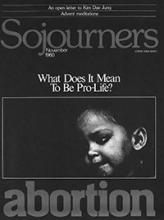The war in Vietnam de-militarized my conscience. And it was the war that first made me think about abortion.
I was an ardent anti-war high school kid. Then in 1969--at 17--I went to work for the United Farm Workers at a time when there was great concern about exposure to dangerous agricultural chemicals. I recall that I wrote a poem linking the many symptoms of the one violence: the war in Vietnam, the wholesale herbiciding of the drainage ditches, the clamor for abortion. Control, I thought. It's the obsession to control. People will destroy anything they can't control.
A few years later I was, as they say, sexually active. Any woman who's ever been in a similar situation can recognize this scene: a few restless nights when your period's a little delayed; then growing anxiety, tears, panic when it's really late.
Fortunately, those late periods were all false alarms. But after a few episodes like that, I had to clarify my values.
If I were pregnant, would I get an abortion?
No. I'm a pacifist.
At that time, it wasn't, "No, that wouldn't be fair to the child," or "No, that's against God's will." It wasn't even a matter of ethics, much less religion. It was more a question of self-concept: I'm a peace woman. If I kill when it's my choice, how can I ask anybody else not to kill when it's their choice?
So that's where it stood, personally; but though my lifestyle began to be transformed by that decision, I never thought of it politically. I knew I'd protect my unborn child; I didn't think of protecting anybody else's.
Read the Full Article

